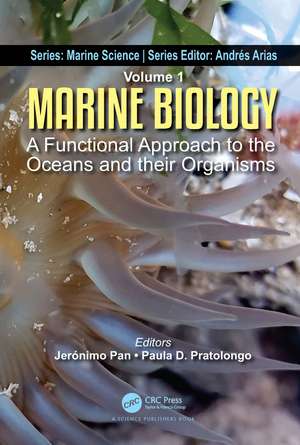Marine Biology: A Functional Approach to the Oceans and their Organisms: Marine Science Series
Editat de Jerónimo Pan, Paula Pratolongoen Limba Engleză Paperback – 27 mai 2024
| Toate formatele și edițiile | Preț | Express |
|---|---|---|
| Paperback (1) | 487.58 lei 6-8 săpt. | |
| CRC Press – 27 mai 2024 | 487.58 lei 6-8 săpt. | |
| Hardback (1) | 1288.04 lei 6-8 săpt. | |
| CRC Press – 3 mar 2022 | 1288.04 lei 6-8 săpt. |
Preț: 487.58 lei
Preț vechi: 529.98 lei
-8% Nou
Puncte Express: 731
Preț estimativ în valută:
93.31€ • 101.32$ • 78.38£
93.31€ • 101.32$ • 78.38£
Carte tipărită la comandă
Livrare economică 22 aprilie-06 mai
Preluare comenzi: 021 569.72.76
Specificații
ISBN-13: 9781032193908
ISBN-10: 1032193905
Pagini: 394
Ilustrații: 166
Dimensiuni: 178 x 254 x 22 mm
Greutate: 0.45 kg
Ediția:1
Editura: CRC Press
Colecția CRC Press
Seria Marine Science Series
Locul publicării:Boca Raton, United States
ISBN-10: 1032193905
Pagini: 394
Ilustrații: 166
Dimensiuni: 178 x 254 x 22 mm
Greutate: 0.45 kg
Ediția:1
Editura: CRC Press
Colecția CRC Press
Seria Marine Science Series
Locul publicării:Boca Raton, United States
Notă biografică
Jerónimo Pan is Adjunct Research Scientist at the National Research and Technical Council of Argentina (CONICET). He received his double B.Sc. degree in Ecology and Botany from the National University at La Plata (UNLP) in 2000. He then obtained a M.A. degree in Higher Education, also from UNLP. In 2004, he was awarded the prestigious Fulbright fellowship to pursue graduate studies in the United States; he went on to earn his Ph.D. in Marine and Atmospheric Sciences in 2010, from the State University of New York at Stony Brook. Dr. Pan was the 2000 recipient of the ‘J.V. González’ Distinction as class Valedictorian, and in 2011 he was presented the Antarctica Service Medal of the USA from NSF, among other honors.
Dr. Pan’s research focus is in coastal and estuarine ecosystems. Throughout his career, he has studied the ecosystemic role of bivalve suspension-feeders, microphytobenthos and phytoplankton dynamics, and the ecological role of modern microbial mats in coastal environments, on which he has dozens of publications. He is currently on the editorial board for the journal Frontiers in Marine Science. Dr. Pan has participated in oceanographic campaigns in the northwest- and southwest Atlantic Ocean, and the Ross Sea in Antarctica. In addition to carrying out research in Marine Biology, he has taught several undergraduate and graduate courses in the USA and Argentina, led educational field trips and scientific campaigns to coastal areas, and mentored students.
Paula D. Pratolongo is an Independent Researcher at the National Research and Technical Council of Argentina (CONICET), and Professor of Marine Ecology at Universidad Nacional del Sur, Bahía Blanca. She graduated in Biology in 2000 and obtained her Ph.D. in Biological Sciences from Universidad de Buenos Aires in 2005. In 2009, Dr. Pratolongo was awarded a Fulbright fellowship to pursue postdoctoral studies at East Carolina University, in the United States. In 2002, she was one of the six young scientists worldwide to receive the UNESCO-MAB Young Scientists Awards, endorsed by the International Coordinating Council of the Man and the Biosphere Program, in support of her research on Ecosystems and Water. Current research of Dr. Pratolongo is dedicated to wetlands’ ecology and coastal oceanography.
Dr. Pan’s research focus is in coastal and estuarine ecosystems. Throughout his career, he has studied the ecosystemic role of bivalve suspension-feeders, microphytobenthos and phytoplankton dynamics, and the ecological role of modern microbial mats in coastal environments, on which he has dozens of publications. He is currently on the editorial board for the journal Frontiers in Marine Science. Dr. Pan has participated in oceanographic campaigns in the northwest- and southwest Atlantic Ocean, and the Ross Sea in Antarctica. In addition to carrying out research in Marine Biology, he has taught several undergraduate and graduate courses in the USA and Argentina, led educational field trips and scientific campaigns to coastal areas, and mentored students.
Paula D. Pratolongo is an Independent Researcher at the National Research and Technical Council of Argentina (CONICET), and Professor of Marine Ecology at Universidad Nacional del Sur, Bahía Blanca. She graduated in Biology in 2000 and obtained her Ph.D. in Biological Sciences from Universidad de Buenos Aires in 2005. In 2009, Dr. Pratolongo was awarded a Fulbright fellowship to pursue postdoctoral studies at East Carolina University, in the United States. In 2002, she was one of the six young scientists worldwide to receive the UNESCO-MAB Young Scientists Awards, endorsed by the International Coordinating Council of the Man and the Biosphere Program, in support of her research on Ecosystems and Water. Current research of Dr. Pratolongo is dedicated to wetlands’ ecology and coastal oceanography.
Cuprins
Section 1: Introduction to the Marine Environment 1. Introduction to the Marine Environment from a Geological Perspective 2. Introduction to the Marine Environment from Physical and Chemical Perspectives Section 2: Functional Biodiversity of Marine Organisms 3. Marine Phytoplankton Diversity and Ecology 4. Planktonic Metabolism and Primary Production in the Oceans 5. Microzooplankton: Functionally Diverse Protists in the Pelagic Realm 6. Zooplankton: The Ocean Drifters 7. Gelatinous Zooplankton 8. Soft-bottom Marine Benthos 9. Salt Marshes and Mangroves: Tidal Saline Wetlands Dominated by Vascular Plants 10. Marine Hard Substrate Communities 11. Fish Ecology 12. Marine Megafauna: Sea Turtles, Seabirds and Marine Mammals Section 3: Topics of Current Interest 13. Thermal Plasticity in Marine Organisms 14. Climate Variability and Change, their Impacts on Marine Life and Ecosystems
Descriere
We present you with an updated reference book aimed for upper-level undergraduate and graduate students interested in Marine Biology.
